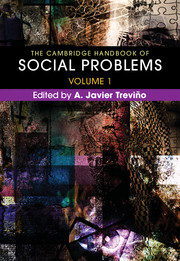Book contents
- The Cambridge Handbook of Social Problems
- The Cambridge Handbook of Social Problems
- Copyright page
- Contents
- About the Contributors
- Introduction
- Part I General Concerns and Orientations in the Study of Social Problems
- Part II Historical and Theoretical Issues in the Study of Social Problems
- Chapter 11 Settlement Sociology
- Chapter 12 Chicago School: City as a Social Laboratory
- Chapter 13 Luhmann's Sociological Systems Theory and the Study of Social Problems
- Chapter 14 The Conflict Approach
- Chapter 15 Radical Interactionism and the Symbolism of Methamphetamine
- Chapter 16 Social Constructionism
- Part III Problems of Discrimination and Inequality
- Part IV Problems of Institutions
- Index
- References
Chapter 14 - The Conflict Approach
from Part II - Historical and Theoretical Issues in the Study of Social Problems
Published online by Cambridge University Press: 16 March 2018
- The Cambridge Handbook of Social Problems
- The Cambridge Handbook of Social Problems
- Copyright page
- Contents
- About the Contributors
- Introduction
- Part I General Concerns and Orientations in the Study of Social Problems
- Part II Historical and Theoretical Issues in the Study of Social Problems
- Chapter 11 Settlement Sociology
- Chapter 12 Chicago School: City as a Social Laboratory
- Chapter 13 Luhmann's Sociological Systems Theory and the Study of Social Problems
- Chapter 14 The Conflict Approach
- Chapter 15 Radical Interactionism and the Symbolism of Methamphetamine
- Chapter 16 Social Constructionism
- Part III Problems of Discrimination and Inequality
- Part IV Problems of Institutions
- Index
- References
Summary
The conflict approach calls attention to the many social inequalities that underlie social problems in contemporary society. The roots of this approach lie in the nineteenth-century work of Karl Marx and Friedrich Engels, which informed the development in the 1960s of conflict theory in the discipline of sociology and the theory's use in the study of social problems. The conflict approach is often seen as a counterpoint to the functional approach, which dominated sociology before the 1960s. This chapter examines the history of the conflict approach, presents its basic assumptions, and discusses its application to several kinds of social problems. The theme of the chapter is that the conflict approach has made important contributions to the study of social problems and underscores the need for fundamental changes in social, economic, and political arrangements for social problems to be successfully addressed.
Information
- Type
- Chapter
- Information
- The Cambridge Handbook of Social Problems , pp. 241 - 258Publisher: Cambridge University PressPrint publication year: 2018
References
Accessibility standard: Unknown
Why this information is here
This section outlines the accessibility features of this content - including support for screen readers, full keyboard navigation and high-contrast display options. This may not be relevant for you.Accessibility Information
- 1
- Cited by
